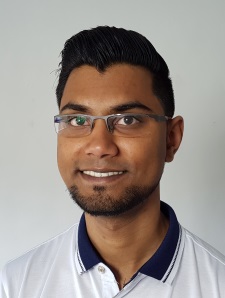School: Computing Sciences / Medicine
Research area: PhD in Applied Statistics
Bio: M A Hussein Wahedally is a PhD researcher in applied statistics in the School of Computing Sciences with a degree in Actuarial Science. His research investigates the use of big health and actuarial data for understanding mortality and morbidity risks. His latest study analyses mortality risks after total hip replacement in the UK

The Projects – A Brief
After graduating at the University of East Anglia in Actuarial Sciences degree in 2012, I was offered the opportunity by my current supervisors, Professor Elena Kulinskaya (Professor in Statistics) and Professor Alexander Macgregor (Professor in Genetic Epidemiology), to join their research team, in the Schools of Computing Sciences and Medicine, to do a PhD in applied statistics for medical and actuarial purpose. The projects I am involved in consist of the development of mortality risk models for individuals in the United Kingdom after total hip joint replacement (THR) and total knee joint replacement (TKR) using advanced statistical analysis.
These projects include looking at the short and long term life expectancy after THR and TKR for individuals with different level of health and socio-economic status. The outputs of these projects are significant research knowledge that assist actuaries in insurance companies in the pricing of life assurance and pension products and in the allocation of financial benefits and bonuses to customers who had THR and TKR. The research outputs equally facilitate joint replacement surgeons in making crucial medical decisions and high-level assessment of THR and TKR patients’ quality of health prior to their surgery.

Why UEA?
Over the last 10 years, UEA has been one of the very few universities in the UK to have contributed significantly to research in major areas such as medicine, cancer research, pharmacy, environment and social sciences. When offered the opportunity to join the glorious research community as a PhD student at UEA, I accepted without hesitation because I wanted to be part of the fantastic research world here.
Over the last 10 years, UEA has climbed up the ranking ladder among the research community and now figures among the Top 10 in the UK for research outputs. This has been a key factor for me to join as a PhD student. Furthermore, the ease of access to project support and funding at UEA has been a motivating force for me to join as an enthusiastic and ambitious PhD student. My supervisors are professionals with huge experience in their respective area, as demonstrated by their long list of publications. This has been a driving force in joining their research team at UEA.
A Typical Day For Me
The typical day of a PhD student varies, depending on the PhD candidate’s research area and supervisors. My research office is based in the School of Computing Sciences at UEA and a typical day starts around 9 am in the morning with a coffee while reviewing the plans of work for the day. Usually, my PhD plans are set up on a weekly basis during the formal meeting I have with my supervisor, once a week. During the first two years of PhD, my mornings were spent in either reading (lots of research materials and literature review books and published journal articles) and collecting information at the same time or doing analysis of data for my research projects. Afternoon working times were kept mainly for reports writing, quick informal meeting with one of my supervisors and attending different courses or optional lectures, provided by lecturers at UEA.
A typical day does not only consist of working times only – I make the most of my time spent on campus by getting involved with a variety of sports clubs and societies. I use one hour in the afternoon for gym and swimming sessions at the Sports Park. Every Thursday afternoon I play football, together with other students. I am part of several societies registered with the student union and enjoy Friday afternoon getting involved in their activities or event organisation. I am part of the Salsa society and I advise it to students to get involved with it as it truly offers a fantastic time, away from academic life.
Highlights of PhD Experience
Every year of my PhD has been different, academically and life experience–wise. From first year to my final year of PhD, the great highlights have been:
- Successful application of research grant to the Institute of Actuaries, UK for my PhD project.
- Completed a 4 weeks training for PhD students in statistics at Cambridge, Nottingham, Glasgow and Warwick university.
- Won a football tournament with my PhD colleagues in an inter-school competition at UEA.
- Research paper accepted at the International Mortality Symposium, 2014, organised by the Institute of Actuaries, UK, Birmingham university.
- Involved with International and Admission Office at UEA as an international ambassador for Mauritius.
- Taking part for UEA football team for the Derby Day 2015.

:focus(1907x941:1908x942))